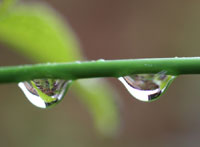1992年12月22日,联合国大会的47/193号决议设立了世界水日(每年3月22日)。这是提醒公众重视水资源问题的一个特殊的日子。在这个日子里,我们可以意识到:向人们提供纯净饮用水的切实努力和世界范围内对于水问题的认识提高,能够帮助我们在水资源问题上,做得更出色。
在2003年12月23日的58/217号决议中,大会宣布从2005年3月22日的世界水日开始,2005年至2015年为“生命之水”国际行动十年。
2006年世界水日的主题是“水与文化”,将由联合国教科文领导。
 About World Water Day
About World Water Day
World Day for Water, or unofficially World Water Day (WWD), occurs each year
on March 22, as designated by United Nations General Assembly resolution.
This day was first formally proposed in Agenda 21 of the 1992 United Nations
Conference on Environment and Development (UNCED) in Rio de Janeiro, Brazil.
Observance was expected to begin in 1993 and has grown significantly ever since.
The UN invited its member nations to devote this day to implementing UN
recommendations and promoting concrete activities within their countries. Each
year, one of various UN agencies involved in water issues takes the lead in
promoting and coordinating international activities for WWD.
World Day for Water 2006: Water and Culture
WWD 2006 will be guided by the theme 'Water and Culture' under the leadership
of United Nations Educational, Scientific and Cultural Organization (UNESCO).
International Decade for Action 'Water for Life'
2005-2015
2005-2015年“生命之水”国际行动十年
Water is crucial for sustainable development, including the preservation of
our natural environment and the alleviation of poverty and hunger. Water is
indispensable for human health and well-being.
The United Nations General Assembly, in December 2003, proclaimed the years
2005 to 2015 as the International Decade for Action 'Water for Life'.
The 'Water for Life' Decade was launched on 22nd March 2005 by the United
Nations Secretary-General Kofi Annan with the following video message:

Click to view the video message
Dear friends,
Water is essential for life. Yet many millions of people around the world
face water shortages. Many millions of children die every year from water-borne
diseases. And drought regularly afflicts some of the world's poorest countries.
The world needs to respond much better. We need to increase water efficiency,
especially in agriculture. We need to free women and girls from the daily chore
of hauling water, often over great distances. We must involve them in
decision-making on water management. We need to make sanitation a priority. This
is where progress is lagging most. And we must show that water resources need
not be a source of conflict. Instead, they can be a catalyst for cooperation.
Significant gains have been made. But a major effort is still required. That is
why this year marks the beginning of the "Water for Life" Decade. Our goal is to
meet the internationally agreed targets for water and sanitation by 2015, and to
build the foundation for further progress in the years beyond.
This is an urgent matter of human development, and human dignity. Together,
we can provide safe, clean water to all the world's people. The world's water
resources are our lifeline for survival, and for sustainable development in the
21st century. Together, we must manage them better.